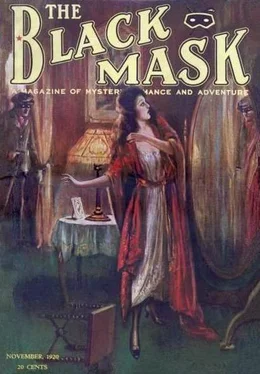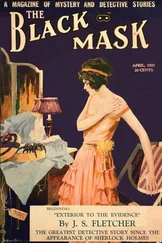Hamilton Craigie - The Black Mask Magazine (Vol. 2, No. 2 — November 1920)
Здесь есть возможность читать онлайн «Hamilton Craigie - The Black Mask Magazine (Vol. 2, No. 2 — November 1920)» весь текст электронной книги совершенно бесплатно (целиком полную версию без сокращений). В некоторых случаях можно слушать аудио, скачать через торрент в формате fb2 и присутствует краткое содержание. Город: New York, Год выпуска: 1920, Издательство: Pro-distributors Publishing Company, Жанр: Классический детектив, на английском языке. Описание произведения, (предисловие) а так же отзывы посетителей доступны на портале библиотеки ЛибКат.
- Название:The Black Mask Magazine (Vol. 2, No. 2 — November 1920)
- Автор:
- Издательство:Pro-distributors Publishing Company
- Жанр:
- Год:1920
- Город:New York
- ISBN:нет данных
- Рейтинг книги:5 / 5. Голосов: 1
-
Избранное:Добавить в избранное
- Отзывы:
-
Ваша оценка:
- 100
- 1
- 2
- 3
- 4
- 5
The Black Mask Magazine (Vol. 2, No. 2 — November 1920): краткое содержание, описание и аннотация
Предлагаем к чтению аннотацию, описание, краткое содержание или предисловие (зависит от того, что написал сам автор книги «The Black Mask Magazine (Vol. 2, No. 2 — November 1920)»). Если вы не нашли необходимую информацию о книге — напишите в комментариях, мы постараемся отыскать её.
The Black Mask Magazine (Vol. 2, No. 2 — November 1920) — читать онлайн бесплатно полную книгу (весь текст) целиком
Ниже представлен текст книги, разбитый по страницам. Система сохранения места последней прочитанной страницы, позволяет с удобством читать онлайн бесплатно книгу «The Black Mask Magazine (Vol. 2, No. 2 — November 1920)», без необходимости каждый раз заново искать на чём Вы остановились. Поставьте закладку, и сможете в любой момент перейти на страницу, на которой закончили чтение.
Интервал:
Закладка:
Bailey sat down. “You know me apparently, monsieur, or else you are an extraordinarily good guesser. If that is the case, possibly you can guess why I am here.”
A bleak look came into the old man’s face. He nodded.
Bailey heard the creak of cautious footsteps in the next room. He knew that old Bertal lived alone, and that in all probability the newcomer was the messenger of death.
It was pitch dark beyond the portieres, but Bill seemed to sense a blacker shape flattened against the opposite wall. Without an instant’s hesitation, he flung himself, muscular hands outstretched at the intruder, while he shouted to Monsieur Bertal to turn on the light.
He crashed against an athletic body, and received a vicious blow in the face. They clenched, and in the struggle tore a handkerchief from his opponent’s face, but it was too dark for recognition. Bertal was taking an exasperatingly long time in reaching the electric switch.
Then someone struck Bailey from behind. He reeled back, loosening his hold. The intruder tore himself free, flung open the door, and clattered out through the hallway. Bertal turned on the lights. There was no one in the room save these two.
In the street the gendarme raised an enormous pother as he ran after the fellow, but Bailey did not aid him. He simply stood and looked at Bertal.
“An explanation would not be. out of place,” he said coldly. “I risked my neck for you, and then you try to break it.”
“That is my affair,” said Bertal sullenly. “And now, we will get the principal business of your visit over and done with. I know why you—a detective—are here, and I confess freely. I killed John Sheppard on the Paris-Marseilles express!”
He opened a drawer in the table, and took out a knife, with a clotted blade.
“This is what I did it with,” he said.
When the gendarme returned, panting, and with nothing to show for his chase, Bailey left him in charge of the apartment, and took Bertal to the prefecture of police. He had not commented on Denise’s confession. He said, nothing concerning this one.
Captain Goulet smiled grimly when the American explained that Bertal had shouldered responsibility for the murder. He shook his finger reprovingly, as though the old chemical engineer were a bad, bad boy.
“It is strange, very strange, Monsieur Bailey,” he said, “and, as you Yankees say, brisk business, eh. First Mademoiselle Girard confesses, then Monsieur Bertal, and just five minutes ago Monsieur Robert, the blind man, sent for us, and said that he alone was responsible for Sheppard’s death. Now, who is really telling the truth?”
V
“Take Monsieur Bertal to a cell,” the prefect directed a gendarme. “I would like to know, Monsieur Bailey, just where we stand in this matter.
The Department of Justice man grunted. “So would I. As S. Holmes used to say, ‘It is a capital mistake to theorize before we have all the data.’ I am going out to get that data. Did you instruct the Chef de Gare to hold the murder car for my investigation, and also keep the entire train crew so I can interview them?”
“Yes.”
“All right. Now, we’ll have the three confessors come out here one at a time, and tell us in detail just how they committed the crime. After that I’ll examine the car and the crew, and if that doesn’t get us some real information, I’ll go back to kindergarten.”
Goulet nodded his approbation.
“Bring in Mademoiselle Girard,” he directed.
Bailey promptly effaced himself from the scene by retiring behind a convenient screen, where he could see and hear without being observed himself.
Denise came in presently, her beautiful face white and tear stained. There were blue circles beneath her eyes, and her slender shoulders drooped. Bailey’s heart went out to her in a warm surge of love and pity. She was so young, and so much in need of help.
“Now, Mademoiselle Girard,” said the prefect in a normal conversational tone, “I want you to give me a straightforward description of what happened on the Paris-Marseilles express last night.”
“I— I told you once.”
“It is necessary that it be repeated.” He tapped his teeth with a pen-holder and looked at her quite calmly.
“Before we started from Paris,” she said hurriedly, “Sheppard, whom I knew, spoke to me insultingly. After we passed Lyons I thought I heard an exclamation of pain from the next compartment. I rose and went into the corridor. The door to the compartment was open; Sheppard seized me and drew me in. I— I knew what sort of a man he was, and, having a knife in my girdle, I pulled it out and struck blindly. He fell back on the seat, and I ran into my own compartment.”
“How is it that Madame Berthier and Monsieur Robert heard nothing of this?”
“There were no words passed—little noise. They were both sleeping.”
“You assume full responsibility for this man’s death?”
“I— I do,” she whispered.
“That is all,” said Goulet, motioning the gendarme to take her away. “Bring in Monsieur Robert,” he added.
“He has nothing to do with it—truly, truly he hasn’t,” the girl cried desperately over her shoulder.
When the blind man was led in the prefect addressed the same questions to him.
“I had every reason to hate that man,” answered Robert. “It is not necessary to explain motives—my confession obviates that. Sheppard felt safe with me because I am blind. I could tell by his breathing when he was asleep. When I was sure of it I felt for his throat—oh, so cautiously—and then used my knife.”
“What were your relative positions?” asked Bailey, coming from behind the screen.
“He was sitting next the window, I beside him.”
Bailey nodded gravely.
After the blind man was taken away Bertal was brought back again. He was visibly nervous.
“We want a detailed explanation from you,” Bailey explained.
“It will be brief. Long ago I had — for reasons that need no explanation—determined on the death of John Sheppard. He deserved it if ever a man did, but it was out of the question for me to kill him openly. I knew that he intended leaving Paris when he did. I knew exactly how the train ran; the track it used, its schedule, how it always came to a brief stop in the freight yards beyond Lyons. I learned what compartment Sheppard would occupy. Then I hid myself in a freight car beside the track used by the express. Fortune was kind to me—kinder than I expected. The train halted. I looked, and there, directly opposite me, I saw Sheppard asleep. I leaned across, resting my arm on the side of the express, and drove my knife into his throat. Then I walked back to Lyons, and two hours later caught another train to Marseilles.”
When Bertal had been escorted back to his cell, Captain Goulet looked quizzically at Bailey.
“The further we go the more tangled we get,” he observed. “Mon Dieu! What a fright I had when the body disappeared from the mortuary. I thought surely we had a ghost to deal with. But these are most palpably human folks, and each of their confessions are logical when taken alone. Together—” He shrugged his shoulders.
“We’ll straighten them out,” Bailey reassured him. “I’m off now, and I won’t be back until I’ve laid my hands on something definite.”
It was not until nine o’clock next morning that Bill returned, but he was as fresh and clear eyed as though he had been sleeping all night. Captain Goulet greeted him hopefully.
“I’ve made some progress,” the agent admitted in answer to the prefect’s question. “In fact, most of the mystery has disappeared. If you will have the three prisoners brought in again I think we can get the other phases cleared up.”
Читать дальшеИнтервал:
Закладка:
Похожие книги на «The Black Mask Magazine (Vol. 2, No. 2 — November 1920)»
Представляем Вашему вниманию похожие книги на «The Black Mask Magazine (Vol. 2, No. 2 — November 1920)» списком для выбора. Мы отобрали схожую по названию и смыслу литературу в надежде предоставить читателям больше вариантов отыскать новые, интересные, ещё непрочитанные произведения.
Обсуждение, отзывы о книге «The Black Mask Magazine (Vol. 2, No. 2 — November 1920)» и просто собственные мнения читателей. Оставьте ваши комментарии, напишите, что Вы думаете о произведении, его смысле или главных героях. Укажите что конкретно понравилось, а что нет, и почему Вы так считаете.












